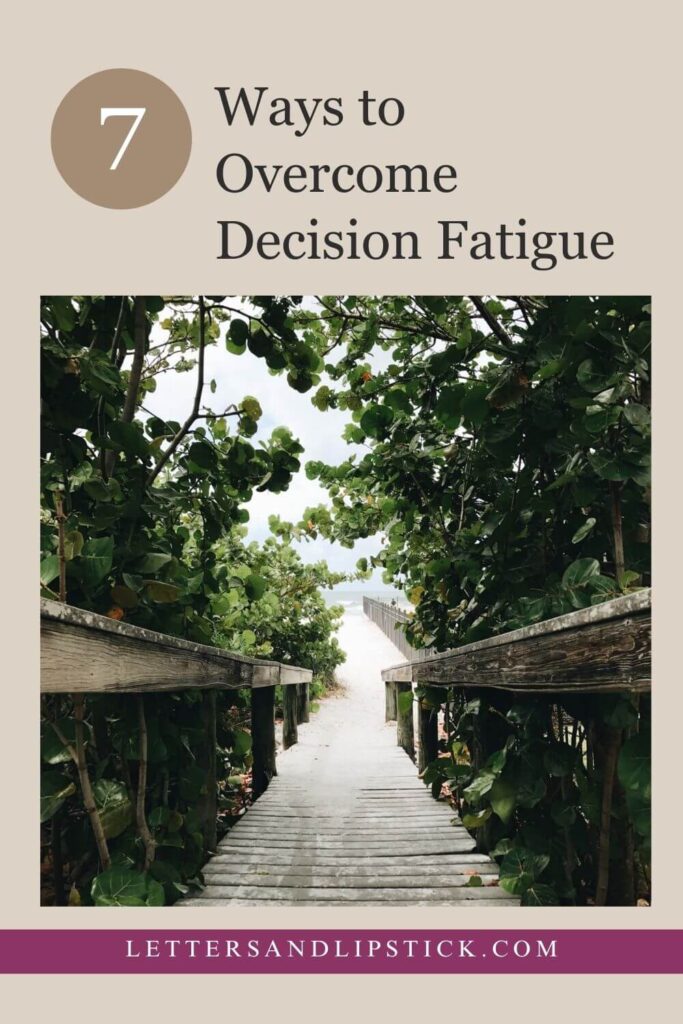It goes without saying that those who can make decisions easily without experiencing decision fatigue and can go about their lives are privileged and lucky to do so.
Sometimes, when there are too many good decisions to choose from, we can jokingly complain, “Decisions, decisions, decisions.”

Certain choices can be fun
There are some choices we’d love to have to make, right? Where if you had to pick where you’d want to vacation without regard for cost or time? Here are some options: a week in the Maldives, enjoying all that a 5-star beach bungalow has to offer, or a week in Morocco, exploring the cuisine and culture, including the blue city, or a vineyard experience in Chile, where you can become a mini-expert in the running of a wine estate, or surfing along the Lisbon coast in Portugal then hanging out on the beach with people from all over the world, where music is set up for dancing for the night.
These are the kinds of decisions that can be fun to make. The problem becomes if there are too many choices, big and small, that distract you from your bigger purpose.

Decision Fatigue defined
Yet, the everyday decisions that we must make to navigate our day can fatigue us to the point that we becoming too fatigued to make good decisions. According to psychiatrist Dr. MacLean, “Decision fatigue is ‘the idea that after making many decisions, your ability to make more and more decisions over the course of a day becomes worse… The more decisions you have to make, the more fatigue you develop and the more difficult it can become.”
It can be problematic if you are making important decisions when you are fatigued, lessening your ability to make good decisions. While some decisions, such as what to cook or eat for dinner won’t seem as if it will have devastating effects at first glance, that’s not necessarily true. Poor decision making over what to eat for dinner over time can have negative effects on health if those choices are low in nutrients and high in calories.
So, if you are making too many decisions throughout the day, then by the end of the day, your ability to make good decisions lessens. And if you want to thrive in life, you will need to make the best decisions for yourself and those you are responsible for, even if they seem simple enough.

When you can’t see the forest through the trees
Sometimes our work-life requires us to make many decisions in the span of the day. Most of what we do during the day requires making choices, a decision; some small, some big. However, each requires the same activity—that of making a decision. Even though we may make decisions or take decisions lightly because their outcome doesn’t involve high stakes, the process can still be exhausting. Does this mean that we are suffering from decision fatigue? More importantly, what does this mean for your quality of life?

What did Einstein, Jobs, and Obama Have in Common?
Apparently, according to my old college friend and Albert Einstein aficionado, Einstein himself, had a couple of personality quirks: one, since he didn’t want to clog up his brain with mundane information, he never bothered to learn his phone number; and two, since he wanted to eliminate choice from his morning routine, he always wore the same type of outfit, so let’s say the same type of shirt, in the same color. This way, he’d save his decision making for the more important pursuit of science.
Another notable public figure who always wore the same outfit was Steve Jobs. You probably remember that he often wore sneakers, blue jeans, and a black turtleneck, much for the same reason as Einstein.
I also remember seeing an interview with President Obama that supported this idea. He said that when he first moved into the White house, he gave the chef a list of things he didn’t like to eat, rather than deciding daily what he wanted or didn’t want, to take out the daily decision-making that it involved. I don’t know how many of us would opt to do the same, with our own personal chef and no doubt a great one, but when you are running the United States, you have a lot of important decisions on your plate, so that makes perfect sense.

Decision Fatigue and Your Job
I know that in the classroom, I made hundreds of decisions a day. Can someone go to the bathroom? In a high school, that’s about 50 kids asking a day. And no, you can’t deny bathroom privileges as it’s considered a human right to use the bathroom within a reasonable time frame from the asking, but you did have to monitor it, so more deciding. Is Johnny taking too long? Is he ill or socializing? Should someone go check up on him? Then, there’s the grading. Since you are also giving feedback as you edit, everything is a decision. Also, what you are going to teach and how exactly?
Other jobs always require constant decision making, more or less. For those of us who are suffering from this mental overload, how do we protect ourselves from being so fatigued we are making poor decisions in our lives?
Decision fatigue is made even worse when scarcity is involved, as the writers, Sendhil Mullainathan and Eldar Shafir make a case for how scarcity affects decision-making in their fabulous book, Scarcity: Why Having So Little Means So Much.

Can making too many decisions negatively impact your goals?
Naturally, if your personal life and work life are set up so that you are having to make dozens of decisions, you might end up suffering from decision fatigue.
According to this article in Psychology Today, we make 35,000 decisions per day. Even a fraction of that would be challenging, I think. But it makes sense. Should I go this way or that way? Is it better to check my phone now or not? Do I answer that message now or later?
Here are 5 ways Decision Fatigue can interfere with your goals:
It makes us reactive.
In that we are reacting to our environment rather than leading the day with our goals either at the forefront of our minds or even simmering at the back until later.
We make impulsive decisions without really thinking things through.
This can be a problem if you throw away what you have going on that is good because you’re too tired to spend the effort really thinking things through.
The fatigue becomes too much and we need time spent to recover, so we just zone out.
We keep making the same type of decisions when we need to change things up. There’s nothing wrong with some rest and relaxation, but you know when you’ve crossed the line from regular time to rejuvenate to spending most of your free time recovering. When this happens, our personal lives and also anything that may involve other goals gets pushed forward, farther out of our reach.
Some decisions need intense concentration before being made.
If you’re decision fatigued, you don’t have good mental stamina. You might not consider multiple possibilities and outcomes. Sometimes we need to deep dive into our decisions, which becomes impossible to do when we are fatigued.
Over time, you become less involved in your own life.
If you are consistently not making good decisions with your life, this will show up. Before you know it, you are not living your best life, and unhappiness and frustration sets in, and along with this, other sets of problems.
Easier said than done
The simplest, of course, would be to completely eradicate that which is causing this. Quit that job. Leave that situation. But most of us are not in a position to do this. Besides, many worthwhile jobs and things in life require us to make many, many decisions daily, so we can make a few adjustments to stop this decision fatigue from impacting us negatively.

7 ways to overcome decision fatigue
Avoid micro-managing.
Can you trust those you are part of your work and home team to do their part? If you do, then don’t stop to check every decision they make as you go along throughout the day.
Automate what you can.
Do you need to pay a bill? Automate it then you don’t have to worry about when and how you will go about doing this. Delegating is good as well but it won’t get its own category as this comes with a lot of privilege and it’s a bit of a cheat.
Plan ahead.
Have a designated time to make certain decisions rather than sprinkling them throughout the day. Deciding on things earlier can help things not feel as urgent, and make room for better, easier decisions. For instance, you can plan meals for the week one day during the week, and you can decide on your work clothes, even your work from home clothes, ahead of time.
Do similar tasks together.
This helps with decision-making that is on similar topics and might be dependent on each other. This also helps move your to-do list further along as there is a kind of momentum that gets built in.
Keep track of earlier good decisions.
If you’ve ordered something you like from a restaurant, keep track of what it was. If you had a good experience with a service provider, keep that info. You don’t always have to re-invent the wheel for yourself. Give yourself the cushion. You can keep the info in a notebook that you have handy or even in the notes app on your phone.
Let someone else who would like to decide, do so.
If you really don’t want to or think you have a preference, you can ask someone to, “Surprise me.” Beware: you don’t want to give away your autonomy, so use sparingly.
Reflect on how you can improve leaving lesser important decisions behind.
Be kind to yourself. This is something that you will continue to be challenged with, and thank goodness because it means you are privileged enough to be making decisions. The key is in finding the balance so that you are not becoming overwhelmed and stressed by decision fatigue at the cost of your life goals and personal fulfillment.
Concentrate on what really matters: you
If you are going to have autonomy in your life and live the life of your dreams, you need to be making good decisions for yourself. This means you need to focus on making more meaningful decisions that will help you get from where you are to where you want to go, rather than on those everyday decisions that are mostly concerned with the mundane, and which can bog you down.
What has your experience with decision fatigue been? I’d love to hear your comments.
-Isabel
Save these tips for later!







